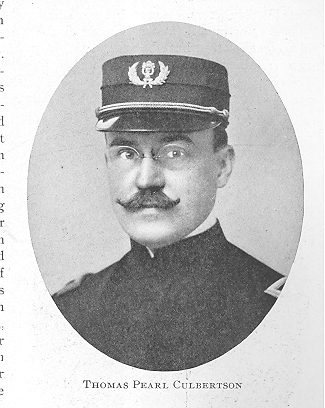
Thomas Pearl Culbertson, Conductor of the Band of the National Military Home at Dayton, Ohio, is a musician of unquestioned ability. He was born on the 17th of November, 1874, in Darke County, Ohio, the son of Thomas W. Culbertson, a farmer, and Elizabeth Harper Culbertson, both of whom are natives of the State. For many generations the ancestors of Mr. Culbertson lived in this country, and his immediate progenitors were early settlers of Darke County. Mr. Culbertson in early life displayed a precocious talent for music, which", upon its recognition by his parents, was carefully developed. At the age of fifteen years he started his musical education and studied the cornet under able instructors, such as Hermann Bellstedt, of Cincinnati. He also was a member of the Greenville Band. His early youth was spent on a farm, where he worked during the summer months, attending school in winter and continuously studying music. When twenty-one years old, Mr. Culbertson decided to permanently engage in the profession of music, and for the following seven years was cornetist and cornet soloist in the Dayton Military Home Band. On the 1st of July, 1903, hewas made Bandmaster of that body. Under his directorship the band has attained. an enviable reputation. During the summer months it gives daily concerts, which are appreciated and listened to by multitudes. These concerts are enhanced by the excellent work of Mr. Culbertson as cornet soloist. He was married on the 29th of June, 1904, to Miss Elsie Sheehan, an accomplished young lady of Dayton. His office is located at the National Military Home at Dayton, Ohio.
William Henry Dana, Author and lecturer. Born on the loth of June, 1846, at Warren, Ohio. Member of the New England family, members of which became famous in art, science, journalism and law. Mr. Dana received his education at Williston Seminary, East Hampton, Massachusetts, and in England and Germany. His National reputation has been gained largely through his lectures on social, travel and other topics. Was the founder of and is the President of Dana's Musical Institute. Is the author of many text-books, for which he received a medal and diploma at the International Exposition at Bologna, Italy, in 1888. Was one of the three who founded the Music Teachers' National Association.
William Dolwer, A well-known bandmaster and musician of Marion, Ohio, proprietor of the sheet music and general musical merchandise business located at No. 216 West Center Street, Marion, was born on the 7th of April, 1870, at South Bloomfield, Pickaway County, Ohio. Both his
- 725 -
parents, John and Sarepta Corder Dowler, were natives of the Buckeye State, and of English-Germin descent. He obtained his education in the public schools and studied music in Marion, to which city he came in 1883. He entered his profession as a teacher of piano, violin and brass instruments, and came to the front in his profession, gaining a splendid reputation for efficiency. He is now the leader of Dowler's Orchestra, formerly known as People's Orchestra. For many years, he has conducted his establishment and has been a publisher of music, known in wide circles. Some of his own compositions, mostly marches. dances and songs, have been favorably received and obtained a wide circulation. Mr. Dowler is a prominent member of the K. of P. On the 25th of December, 1890, he was married to Nannie Lee Tadlock. By this union he is the father of four children, three boys and one girl. His residence is to be found at No. 215 North Grant Avenue, Marion, Ohio.
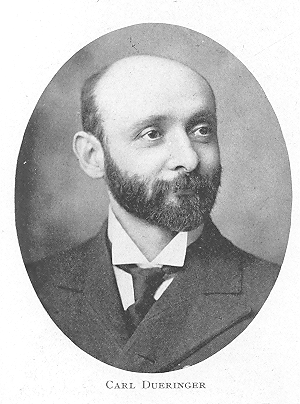
Carl Dueringer, Teacher of Music at Cleveland, Ohio, needs no introduction to the musical people in the northeastern part of Ohio, where he enjoys the enviable reputation of being an artist of rare ability. Mr. Dueringer, who is connected with the Johannes Wolfram School of Music, Cleveland, Ohio, received the very best musical education, attending the celebrated Royal Conservatory of Music at Leipsic, Germany, where, under the leadership of such masters of the violin as Bermann Becker and Brodsky, he acquired a most thorough knowledge of the art of violin playing. On his arrival at Cleveland, Ohio, from abroad, he was at once tendered a position with the Philharmonic Quartette, an organization which stands very high in the estimation of music lovers throughout the country, and with which he is still connected. As a teacher, Mr. Dueringer has been pre-eminently successful. Even his very young pupils play with excellent precision and style, showing superior training to such an extent that the enthusiasm and appreciation of both pupils and parents are most excellent endorsements of the quality of his work. Mr. Dueringer's success as a teacher of children has been remarkable, his juvenile classes including pupils as young as seven years, having been heard in splendid renditions, while his advanced pupils occupy prominent places in the musical life of Cleveland. Mr. Dueringer has often appeared in public as violin soloist, as well as in ensemble work, meeting everywhere with brilliant success. Mr. Dueringer is married, and lives with his family in Cleveland. His studios are located in the Arcade Building.

Orville David Eastman, A prominent musician of Akron, Ohio, was born on the 24th of November, 187o, at Montford, Grant County, Wisconsin. His father was David Eastman, a farmer and stock dealer' a native of Canada ; the mother, Frances Isabel Nichols, a resident of the above
- 726 -
mentioned State. At the opening of the Civil War in 1861, the father enlisted in Company I, Tenth Regiment, Wisconsin Volunteers, and served all through the different battles in which his regiment was engaged, until he was taken prisoner at the battle of Chickamauga. He was confined three months in Richmond Prison and five months in Andersonville Prison. On his return to Wisconsin, for eight years he was a member of the Grant County Board of Education, and for the same period. was Chairman of the Board of Supervisors of the town of Wingfield. Professor Eastman received his education in the Montford High School and at Dickson Business College, Dickson, Ill. Deciding to enter the musical career for which he early displayed a natural tendency, he entered the Conservatory of Music at Dickson, Ill., and later the Dana Musical Institute at Warren, Ohio. He graduated from Dana's Institute in 1902 and from the Dickson School of Music in 1894. He also studied. music under some of the best teachers of this country and Europe. At the early age of sixteen years he acted as instructor in music, which position he has always followed during his active life. His particular work is teaching piano, and he also appears often in public as soloist. He is the author of one work on musical history and musical terms, and has composed several marches, songs and orchestral pieces. In politics he is a Republican. Mr. Eastman is. a member of the Brotherhood. of the First Church of Christ. On the 8th of May, 1896, Miss Live M. Boger became his bride. One child is the issue of that union, Naomi F. Eastman. Mr. Eastman is the director of the Ladies' Symphony Orchestra, at Akron, Ohio. His residence is located at 84 North Forge Street, and his studio at 72 South Main Street, Akron, Ohio.
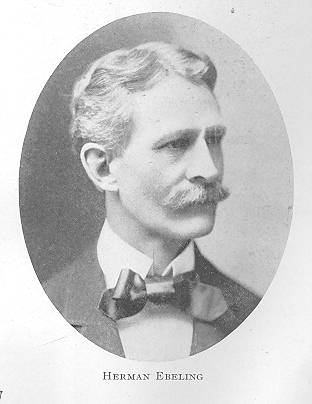
Herman Ebeling, Who is recognized as one of the leading musicians in the State of Ohio, and a man who has played a leading part in the advancement of music in Columbus, Ohio, the city in which he now has his studio, was born in the city of Brunswick, Germany, the son of Heinrich and Henrietta Jaeger-Ebeling. Coming to this country with his parents when but a child, he early developed a talent for music, and upon its manifestation his parents decided to give him a thorough musical training. He received
- 727 -
his first lessons under direction of his father, who was a thorough musician. At the age of seventeen he was engaged as violinist by the Caroline Richings Opera Company, with which he remained one year. Desiring to take a thorough course of study in music, in 1876 he crossed the Atlantic and spent four years at the Conservatories of Leipzig and Stuttgart. There he studied piano and organ and theory. While in Germany, Mr. Ebeling gave a number of recitals on the piano and organ, and met with great success. Returning to America in 1880, he settled in Columbus, and began teaching music. Here he soon acquired a reputation as a thorough teacher. For four years he was organist and choir director in Trinity Church, and in 1887 accepted a similar position in the First Congregational Church, where he remained until he went abroad, in 1896, to finish his musical education under the greatest of all the living teachers of piano, Leschetizky. For two years he remained under his personal direction, and one of Mr. Ebeling's most treasured possessions is the following letter: "Vienna, Austria, June 15th, 1898. I hereby certify that Mr. Hermann Ebeling, of Columbus; Ohio, America, has studied the piano with me two seasons. Through his earnest endeavors, Mr. Ebeling has acquired solid, practical and pedagogic knowledge of his instrument, which entitles him to carry out his work with the greatest success, not only as a concert pianist, but particularly as a teacher. Professor Leschetizky." In 1898, Mr. Ebeling returned to Columbus, where he immediately became a leading factor in musical circles. Under his directorship a number of musical events of importance in Columbus have been arranged, among others three operas, "The Armourer," "The Bohemian Girl" and "La Preciosa," and a number of chamber concerts. Mr. Ebeling was at one time director of the Columbus Maennerchor, the oldest singing society of that city. He takes an active part in the work of the Ohio Music Teachers' Association, and in 1904 was President of that body. His marriage to Miss Grace Jones occurred. in 1891, and by that union he is the father of three children. Mr. Ebeling spent the summer of 1904 in Europe and visited Leschetizky at Ischl, his summer home, taking with him one of his advanced pupils. After hearing her play, the master was so much pleased that he gave Mr. Ebeling a second certificate, which, translated, is as follows : "Ischl, October 4th, 1904. To Mr. Ebeling, in remembrance and confirmation of his distinguished work as teacher. Theodore Leschetizky."
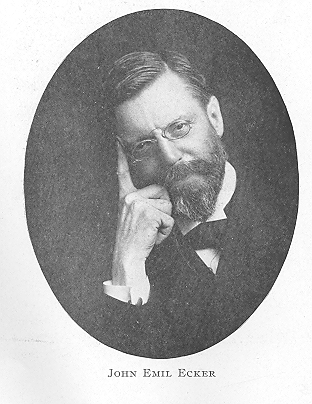
John Emil Ecker, Of Toledo, Ohio, a musician and teacher of piano of high standing, is a native of Austria, being born on the 14th of April, 1853, at Traun on the Attersee, in the neighborhood of Linz, Upper Austria. His parents were Martin. Ecker and Anna Niszl Ecker, both of whom emigrated to this country in 1857. Martin Ecker, the father, was a teacher in the schools of Austria and in this country as well, where he was also an organist. Mr. John Ecker was educated in the public schools of Nauvoo, Illinois. His musical education was directed by his father, who started the son in his musical career at the early age of six, and until
- 728 -
he reached the age of ten, carefully guided him in that profession. From that time Mr. Ecker was left to his own resources. He was nineteen years of age when he became a teacher of German in the public schools of Mendota, Illinois, where he remained for one year, from 1872 to 1873. The following year he went with his father to Toledo and entered the ranks of the teachers in the public schools of that city, teaching the German language, holding his position until he could follow his natural inclination and .study music under the masters of the Old World. At the age of twenty-nine he became a student at the Royal Conservatory of Music at Leipsic, Germany, studying there for a period of four years, 1882 to 1886, graduating with high honors and a full "Directorial Zeugniss" from that institution. Returning to his native country, he became actively engaged in the profession of teaching piano, harmony, counterpoint, composition and orchestration in the city of Toledo, where he is also organist and choir director. He is a composer of a number of compositions for piano, a few songs and anthems, and an overture for full orchestra, which received' its first performance at the celebrated "Gewandhaussaal" in Leipsic in 1886. He also composed a concerto for piano with orchestral accompaniment, and a March Sollennelle for full orchestra. The latter three are still in manuscript. Mr. Ecker is recognized as a man of extraordinary ability in his profession, and a most conscientious and painstaking teacher. He was married on the 30th of July, 1890, to Sophia E. Mandeville, nee Commager. His studios and residence are located at No. 315 Indiana Avenue, Toledo, Ohio.

Herman Eckhardt, Deceased, was born in 1820 at Stolpen, Saxony, Germany. At a very early. age he showed a very decided taste for music, and at the age of seven began to study the violin under Klingel. At Dresden he continued his studies under Winterstein, who was one of the best pupils of the great master Spohr. Later he studied with Concertmeister Schubert. At a very early age he passed the rigid examination to enter the Royal Orchestra of Dresden, also studying at this time with the great Lapinski, the only man who could compete with Paganini. While a member of the orchestra he acquired a high reputation as a viola player, and was selected by Wagner to play the leading viola part in the opera of "Tannhaeuser" on its first presentation. At this time he was intimate and played quartettes and quintettes with Liszt, Joachim, Ferdinand Hiller, to whom he gave viola lessons, and Wieck, father of Clara Wieck, who later married Robert Schumann, the great composer. After he had been a member of the orchestra for seven or eight years he was offered the position of conductor of the Saxonia Orchestra, composed of some of the best musicians of Dresden. This position he accepted, and after a tour of the German cities, meeting with phenomenal success everywhere, the orchestra sailed for America, arriving in New York in 1848. They gave concerts in New York, Philadelphia
- 729 -
and Boston, until 1849, when the orchestra disbanded, many members remaining in America, among them Mr. Eckhardt. Here he was leader of the orchestra in the Lowell (Massachusetts) Museum, Boston Museum, and later .in New York at the Broadway Theater, Globe Theater and Fifth Avenue Theater. He was also a member of the Philharmonic Society. In 1851 he was married to Miss Elizabeth Butcher, of Lowell, Massachusetts. In 1869 he went to Columbus, Ohio, as instructor of music in the public schools. He remained in Columbus until his death, in 1896. In this city he spent the best years of his life in very successful teaching, and educating the new West to a higher standard of music.
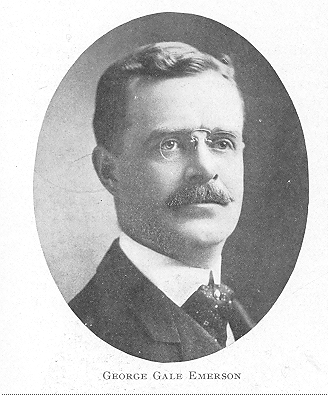
GEORGE GALE EMERSON Organist of the Second Presbyterian Church of Cleveland, Ohio, has his place among the successful teachers of piano and organ in the Forest City. He is a native of Ohio, born in Cleveland, and the son of Taylor and Harriett (Gale) Emerson. He received his musical training under the direction of William B. Colson, of Cleveland ; Clarence Eddy, and the greatest of all American pianists, William H. Sherwood, of Chicago. After finishing his musical education under that celebrated tutor, Mr. Emerson for fifteen years was engaged in his profession in. Chicago and as organist of Trinity Episcopal Church. In 1902 he returned to Cleveland, and since that time has become one of the foremost teachers of music in that community. His studio is located at No. 606 Arcade Building, Cleveland, Ohio.
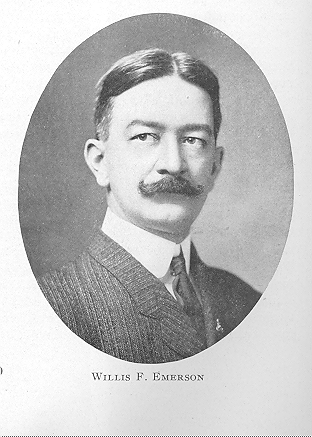
Willis F. Emerson, Manager and Conductor of the Canton Orchestral Club, is a musician well known in the northern part of Ohio. He is a native of Tuscarawas County, being born on the Ilth of December, 1863, on a farm in the neighborhood of New Philadelphia. His parents were James R. Emerson, a farmer, and Martha J. English Emerson, both of whom are of Irish descent. The paternal grandfather of Mr. Emerson emigrated to the United States when a young man, and came to Ohio when the State was still in its infancy. His son, the father of Mr. Willis F. Emerson, was born in the same house as the latter. In the district schools of Lockport, Mr. Emerson obtained his education. Being gifted with a talent for music, he studied violin playing under Profes-
- 720 -
sor Swinger, a well-known teacher in his part of the State. Mr. Emerson came to Canton in 1881, and in this city he found better opportunities for the study of music than in his former place of residence. Finally, in 1890, when he was offered a position in an orchestra, the ambitions of his younger years became realized. Since that time Mr. Emerson has been continuously engaged in his profession, and to-day he is recognized as a musician of ability and a conscientious and painstaking teacher. He is, as above stated, director of the Canton Orchestral Club, a musical organization whose services are in great demand for concerts, balls and receptions. Mr. Emerson had charge of the orchestra which furnished the music for the McKinley Memorial Banquet at Canton, Ohio, when President Roosevelt, Secretary Root and Secretary William Taft were present. Since 1888 Mr. Emerson has been married to Phebe A. Willis. One daughter, Bernice, who has inherited the talent for mtismusicm her father, graces his home, which is located at No. 519 North Market Street,- Canton, Ohio.
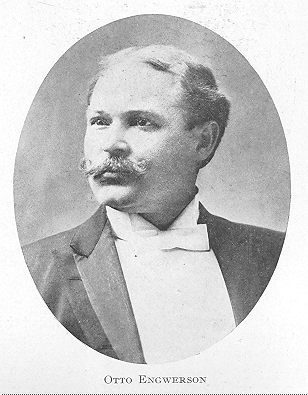
Otto Engwerson, Deceased, of Columbus, was recognized. as one of the superior singers and musicians of the State of Ohio. His voice, a robusto tenor of excellent quality, made him a valuable addition to to soloists as well as to to various choral organizations. A brief bio-graphical sketch is here subjoined.
Mr. Engwerson was born in Bavaria in 1857 and came to the United States at the age of ten years. He received his first music lesson from Julius Eichberg, of Boston, and at the age of nineteen years returned to Germany, where he studied vocal music in Munich under Carl Luetzel and theory under Michael Licht. At this period he was an associate director of the Gesang Verein at Neustadt for about two years. Returning to the United States in 1882, he sang an engagement with the. Boston Ideal Opera Company. Subsequently he located in Cleveland, where he further pursued his musical study under Wilson G. Smith, and filled various choir positions as tenor until 1884, when he went to Chicago, taking the position as solo tenor at Plymouth Church, where he was associated with Genevra Johnston Bishop and others. In Chicago he studied under the eminent tenor, Whitney Mockridge. In the spring of 1890 he went to London, England, and studied voice culture with Henry Blower, of the Royal College of Music, and with Sims Reeves, the celebrated English tenor. He also studied theory under Arthur Briscoe for a period of two years. While in London, Mr. Engwerson sang with success the tenor solos in "Messiah," "Creation," "Elijah" and the "Barbier of Bagdad," the latter at a performance given before the Prince of Wales and the Duke of Edinburgh. He returned to America in 1892, located in Columbus, Ohio, where he became a very successful singer and teacher, having also charge of the vocal department of Denison University at Granville, Ohio. Not only in the class-room was Mr. Engwerson's inspiring ability manifest, but he was essentially a man of ingenious,
- 731 -
original and progressive ideas—ideas acquired and perfected by a thorough musical education. He was elected director of the Arion Club in 1894, in which position he made conspicuous success. Mr. Engwerson was elected President of the Ohio Music Teachers' Association in 1899. Mr. Engwerson died on the 16th of September, 1903, at Carlsbad, Austria, while preparing for a concert tour in Europe.

Owen Hugh Evans, Of Marysville, Ohio, is recognized as one of the leading musicians in the central part of the State of Ohio. He was born on the loth of February, 1848, at Anglesey, North Wales, and is the son of Hugh Evans, a farmer, and Jane Williams Evans. His education was received in a private school in his native town, and later in the public schools of this country. At an early age he manifested a desire to study music, having shown a remarkable talent for that art when still a boy. He therefore entered a musical institution in Wales, studying the Tonic Solfa System, passing three examinations with honors, and when but a boy taught this system successfully for two years at Newborough, Anglesey. He came to the United States in the spring of 1870, settling at Galena, Illinois, and was a successful teacher of singing at that point. Later he attended Dana's well-known musical institute at Warren, Ohio, from which he graduated in 1877. He subsequently went abroad and finished his musical education in London and Leipsic. That he has thoroughly absorbed the teachings of these institutions can be seen by the following degrees, which he holds : Member of the American College of Musicians; Licentiate Music, London College of Music; Doctor of Music and Master of Music. Dr. Evans started in public life at the age of eighteen years, when he took charge of a church choir. Since that time he has been continuously engaged in the practice of is chosen profession, and, it may be truthfully said, with marked success. He is well known as a composer of merit ; among his compositions are two sacred cantatas, a number of anthems, glees, part songs, songs ; a string quintette, for which he received a first prize and medal ; a chorus an dorchestra accompaniment, which was awarded a gold medal ; a set of teaching pieces for piano, and a cavatina for piano and violin. At the present writing, Dr. Evans is director of two church choirs and two choral societies, and he also has a large class of private pupils. On the 1st of September, 1881, he was married to Martha Sprague. Two children are the issue of this union, Owen Earle and Clara Edith. The family attends the First Congregational Church at Marysville. Dr. Evans has an attractive home on West Fifth Street, Marysville, where the music-loving friends of the family pass many delightful moments.
- 732 -
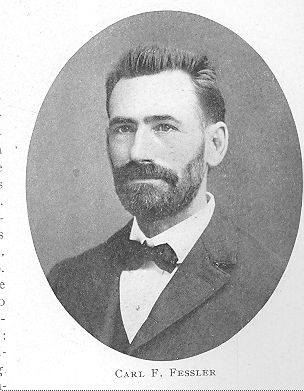
Carl F. Fessler, A very prominent musician of Cleveland, Ohio, and a native of Menzingen, near Carlsruhe, Germany, was born on the 19th of December, 1860, in the above named place. He was educated in the public schools and the Gymnasium of Carlsruhe. In his early youth Mr. Fessler displayed a precocious talent for music, which became so marked that it was decided by his family o give him a very careful training in music, and consequently the best masters, like Gamer, Gamm, Brinck and Arthur Bendix, were secured for his tuition. Completing his studies in Germany, he emigrated to the United States in 1880, where, in the city of Boston, he stayed for one year, following the profession of a teacher of piano. Removing from that city o Cleveland in 1881, he made his permanent home in the metropolis on Lake Erie. He soon became recognized for his ability and his services were in great demand. Since five years Mr. Fessler is connected with the piano department of Wolfram's School of Music. He has often appeared in public as a piano soloist, and is well known all over Northern Ohio. For two seasons he was a member of the Lyceum Bureau. He is a composer of no small degree of merit. Among his compositions the following are the best known : Evening Series (Sundown, Am Kamin, Twilight, Slumber Song, etc.), Russian Wedding. Hungarian Rhapsody, etc. Some of his compositions were published with Rolfing, of Milwaukee, while others are still in manuscript. All of these, however, have been heard in public. Mr. Fessler is a prominent official of the Schlaraffia, at Cleveland. He married in 1892, and is the father of a boy and a girl. His studios are located at 712 Arcade Building, Cleveland, Ohio.
Charles Albert Gouf, Teacher of music and conductor of the orchestra named after him at Lancaster, Ohio, was born on the 1st of May, 1857, in the city of New York. He is the son of Adam Gouf, a well-known broker of the metropolis of the East, who was a native of Germany, coming o this country while very young. His mother, Laura, was born in Boston, of German descent. Mr. Charles Albert Gouf received his education in New York City. While a boy he showed a remarkable talent for music, which induced his parents o give him a thorough musical training and to send him abroad, o finish his studies under celebrated masters. He consequently entered the Royal Conservatory of Music at Stuttgart, where he remained for five years, returning o America in 1876, but afterwards spent another year at Stuttgart. In 1876, Mr. Gouf accepted a position as teacher of music at the Ada Normal School. It was he who organized the music department of that school. Afterwards he was connected
- 733 -
with opera interests in Columbus. For eighteen years Mr. Gouf has been identified with music in the city of Lancaster, where he still resides. He is a popular teacher of piano and organ, and also has directed many choruses and concerts. He is the composer of many two-steps and concert pieces, some of which have become very popular. He is a member of the Elks, and has a studio located at No. 117 South Columbus Street, Lancaster, Ohio.
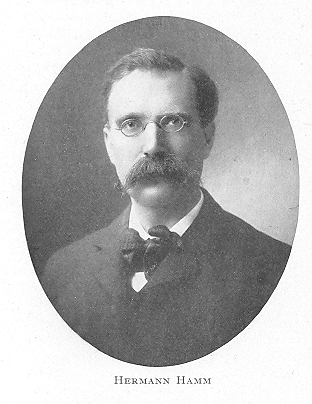
Hermann Hamm, Teacher of voice culture at Cleveland, Ohio, occupies a leading position among the professional musicians of Northern Ohio. A native of Rhenish Bavaria, Germany, he was born on the 4th of July, 1861, in Dellfield, in which city he attended the public schools until he reached the age of eleven years. When a boy he manifested a remarkable talent for music, and on account of this he was instructed by his father, Jacob Hamm, in the rudiments of the art, in which in later years he obtained such a high standing. Leaving the public school at the age of eleven, he was placed under the tutorship of Professor Paul, in Zweibruecken, where he studied music, German and Latin. Wishing his son o become a teacher in the profession the boy showed such a natural aptitude for, his father entered him in the Teachers' Seminary of Kaiserslautern, with which an institute of music, celebrated for its proficient corps of instructors, was connected. Here Mr. Hamm studied piano, violin, voice culture, organ, cello and harmony. Graduating in 1881, he successfully passed the State examination. He afterwards took a post-graduate course, studying another year under Professor Berger piano, violin and harmony, and with Professor A. Damian voice culture. At the age of twenty-one Mr. Hamm started his career as a teacher, being offered a position at the Academy at Pirmasens, which place he filled with credit for a period of three years. During this time he also taught many pupils privately. His, success at the Academy attracted the attention of many who wished to enjoy the privilege of his tuition. In 1885 he accepted the position of Professor in Vocal and Musical Instruction in the Latin School of Pirmasens, and also became conductor of several prominent singing societies. During this time he, with others, founded the Music Verein of Pirmasens. This closed the period of his career in the Old Country, for in the latter part of 1885 he came o America, settling in Cleveland, in which city he has continuously lived ever since, and where he has become a prominent figure in musical circles. Almost immediately after arriving in the Forest City, he became the organist of the Schifflein Christi Church and conductor of prominent singing societies. In 1893 he was assistant conductor of the world famous Saengerfest of the North American Saengerbund held at Cleveland. His musical training in Germany here manifested itself to advantage, he receiving the highest results in the directorship of the rehearsals of the mass choruses. For the past several years Mr. Hamm has conducted a school of music at No. 122 Euclid Avenue,
- 734 -
Cleveland, Ohio, where success has crowned his efforts. On the 2d of December, 1886, he became a benedict, marrying Miss Bertha Kleinschmidt, daughter of a prominent German pioneer of Cleveland. He is the happy father of two children.
R. W. Henderson, Supervisor of Music in the public schools of Lake County, Ohio, outside of Painesville, enjoys more than ordinary prominence among the music teachers in the northeastern part of Ohio. He is well and favorably known all over Lake County as a conscientious and painstaking teacher of wide and varied experience ; for a great many years he has been engaged in teaching music, not only as a private teacher, but also as Supervisor of Music in the country schools of his home county. This is no easy task, as the distances between the different schoolhouses are large and Mr. Henderson has o cover a wide territory. The system Mr. Henderson employs is worth mentioning, as it has proved a great success. He not only instructs the children who attend the country schools, but also the teachers, preparing the latter in a way that they can act as his assistants. This method has worked so well that the schools entrusted o the care of Mr. Henderson have made a wonderful progress in music, and in fact much more than any other country schools in the northern part of Ohio. Mr. Henderson is married, and lives with his family in the pretty little city of Painesville, Ohio.
Karl H. Hoenig, Organist and choirmaster of the Trinity Church, one of the most influential Congregations of the Capital City, was born on the 17th of October, 1865, in the city of New York. His father, Bernhard Hoenig, was a surgeon, and a native of Hessen-Darmstadt. The mother's name before her marriage was Elizabeth Jung. She was born in Hessen-Nassau. Both parents emigrated to this country when quite young, and the father still resides in New York, and has retired. from practice. Mr. Karl H. Hoenig received his literary education in the schools of the Eastern metropolis, and desiring to follow a musical career, in which art he early manifested great ability, he entered the Grand Conservatory of Music in New York City, and graduated from there in 1888. He studied organ with Warren, of Grace Church, and vocal music under Messiter, of Trinity Church, the most celebrated religious organization in the New World. At the age of twenty-one he began his career as a teacher of music, being particularly interested in church music and, choir work. He is well known in the States of New York, Montana, Indiana and Washington, where he for a number of years followed his musical pursuits. Finally locating in the city of Columbus, Ohio, after accepting the responsible position of organist and choirmaster for Trinity Church, he soon became an important factor in the musical circles of that community. By his efforts he has trained a chorus of boys which has become famous by reason of its excellent work. Mr. Hoenig has composed some church music of great merit, and his ability as a thorough musician, teacher and choirmaster has been firmly established. He was married in 1903 o Miss Emma C. Kuhn. His residence is located at No. 554 Oak Street, Columbus, Ohio.

Charles T. Howe, Of Columbus, Ohio, a musician of unusual talent, and the son of Henry Howe, LL.D., the celebrated historian, was born in the city of Cincinnati. His parents were native New Englanders, of English descent, whose ancestors came from the Old World in 1656, settling at Ipswich, Massachusetts. One of his ancestors was "Landlord Howe," immortalized by Longfellow in his "Wayside Inn." Mr. Charles T. Howe was carefully educated in the
- 735 -
common schools of Cincinnati, and at an early age, showing evidence of unusual musical talent, he was given the benefit of instructions by the best music teachers of his native city. He studied the piano, organ and flute, making a specialty of the latter as a solo instrument. His progress was so rapid and his talent so remarkable, that at the age of thirteen he had gained a splendid reputation as soloist, and h is services were in frequent demand at high-class musical instruments. At this time he was also a member of the Cincinnati Orchestra. Removing to New York City at the age of eighteen, he continued his musical studies, receiving valuable instructions from Professor Eugene Weiner, the eminent flute soloist of the New York Philharmonic Club. Although frequently called upon o appear in public at this period, Mr. Howe declined to do so, as he desired to give his entire attention to his studies. The object of these studies was not only o make of himself a finished solo artist, but also with a view to his future career as an instrucor with a full knowledge of his art. While the flute is his specialty, and all his studies were with a view o perfecting himself on that instrument, he held that a knowledge of other branches of the art was necessary to this end, and included the piano, organ, voice, thorough bass, harmony and composition in his course of study. After several years of close application he had reached the high standard set for himself before commencing the practice of his profession as a concert soloist and instructor. Mr. Howe did not complete his studies, for a true artist can never reach a point where study is no longer necessary. His first appearance in an Eastern city was at New Haven, Connecticut, at a concert given in compliance with a request of President Porter, Professors Barbour and Stoeckel, of Yale College, and.fifty other prominent citizens of New Haven. The New Haven Register said : "Charles T. Howe's concert at the Athenaeum last night was a genuine musical success, as was attested by a most enthusiastic audience. * * * Mr. Howe, by his exquisite flute playing in the duo with Mr. Weiner, and his difficult solo, "The Wind," at once convinced his audience that he deserves a place in the front rank of America's best flutists." After an appearance in a number of Eastern cities as a soloist, where his skillful mastery of his instrument created unbounded enthusiasm, he decided, o locate in his native State, and in 1888 removed o Columbus, Ohio. Since this time, Mr. Howe has been permanently engaged in the Capital City in the practice of his profession. A number of years ago he founded the Howe Correspondence School of Music, and he is the originator of the correspondence system of music instruction, his institution being the only school of the kind in the world devoted to the dissemination of musical knowledge. In this school voice, piano, harmony, composition, violin and every other orchestral and band instrument is taught. This school has been very successful from its start, and has become an important factor in the musical education of the people in this country.
- 736 -
Albert H. Hurd, Well-known barione and teacher of voice at Cleveland, Ohio, was born on the 3oth of May, 1870, at Memphis, Tennessee. He is a son of George H. Hurd and Anna M. (Loomis) Hurd. His father practiced for many years in the profession of dentistry in this State, and was a native of Ohio, while his mother was born in Indiana. He comes from old New England stock; his great-grandfather fighting in the Revolutionary army and his grandfather on father's side being a soldier in the War of 1812. Mr. Hurd came to Cleveland in 1874 and was educated in the Forest City. His musical education was obtained by private study and at Dr. Henninges' studios. He started in public life as a teacher of voice culture in 1898, and ranks now among the leading musicians in his community. At present he is connected with the Faculty of Dr. Henninges' studios, and for the period of three years he was a member of the Faculty of the music department of Buchtel College at Akron, Ohio. He does much concert and church work. His voice is a baritone of wide range and excellent quality. He is assistant direcor of the Plymouth Church choir. His residence is located at No. 265 Kennard Street, and his studio at 608 Arcade Building, Cleveland, Ohio.

Sylvester Bennett Hurlburt, Jr., One of the leading musicians of Dayton, Ohio, was born on the 3d of September, 1855, at the Gem City. He is the son of Sylvester Bennett Hurlburt, a well-known car builder. His mother was, before her marriage, Miss Henrietta Miller, a native of New Jersey, his father being a native of the State of Ohio. The son, Sylvester, received his education in the public schools of his native city, and studied organ with J. A. Robert, having shown a remarkable musical talent when still a boy. At the age of twenty-one years he accepted the position of organist at the Grace M. E. Church, and two years later made a voyage to Germany to finish his musical education, and studied organ in the city of Berlin with Oto Dienel, harmony with August Haupt, and piano at Theodor Kullak's Conservatory for two years, after which he returned o America and accepted a position as organist of the Baptist Church in Dayon, which position he has held for fifteen years. At present he is organist at St. John's German Lutheran Church. The ability of Mr. Hurlburt as an organist has been recognized by the leading bodies of the Masonic fraternity of the community in which he has so long resided, they showing their appreciation of his talent by continuously engaging his services as organist of all the Masonic bodies in the city of Dayton for the past 22 years.

Charles M. Jacobus, Director of the Wesleyan School of Music at Delaware, Ohio, ranks among the foremost musicians of Ohio. He is a native of the Buckeye State, born on the 14th of August,
- 737 -
1867, at Delaware. His parents, Edward G. Jacobus and Mary C. Condit Jacobus, were natives of the State of New Jersey. When a boy Mr. Charles M. Jacobus showed a remarkable talent for music. He was educated in the public schools of his home city and the Ohio Wesleyan University. He obtained his musical training at the Ohio Wesleyan School of Music, the New England Conservatory of Music and through private instruction in Boston. He graduated from the Ohio Wesleyan Conservatory of Music with the class of 1890. At the age of twenty-eight years Mr. Jacobus was appointed instructor in the pianoforte department of the Wesleyan School of Music, and five years later was elected director of that institution. He teaches pianoforte and musical theory. Mr. Jacobus is a member of the M. E. Church and lives in the pretty city of Delaware.
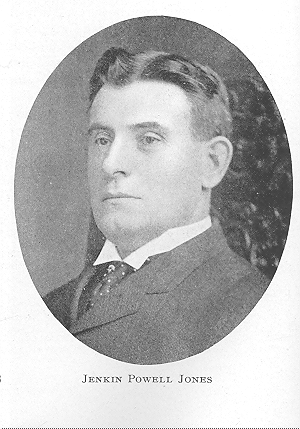
Jenkin Powell Jones, Supervisor of Music in the High and Normal Schools of Cleveland, Ohio, was born on the 28th of June, 1853, at Quaker's Yard, Glamorganshire, South Wales, being the son of Edward Powell and Rebecca Jones. He displayed deep interest in the study of music when very young, his first teacher being the late Rhys Lewis (Eos Ebrill), of Cardiff. Mr. Jones' early educational advantages were few, but that fact seemed only to spur him on, and by dint of energy, coupled with a strong determination to succeed, he ultimately managed to save enough from his earnings as a blacksmith to spend two years in London, where he studied under John S. Curwen, Carl Behuke and Albert Randegger, the celebrated voice specialists. .Mr: Jones has on many occasions demonstrated his capabilities as a conductor. Before coming o this country he was recognized as an able chorus director, and many times proved victorious in eisteddfods with musical organizations from Quaker's Yard, Bargood and Deri. Coming to America in October, 1881, Mr. Jones settled in Youngstown, Ohio, where be immediately became associated in the music publishing business with the well known Welsh musician and publisher, D. 0. Evans. His reputation as a conductor had preceded him to his new home, and being importuned by the leading singers of Youngstown and vicinity to organize a choral society, he acqui-
- 738 -
esced, with the result that the Youngstown Harmonic Society was born, and, under the careful direction of Mr. Jones, became a power in the Musical circles of Northeastern Ohio and Western Pennsylvania, both in concert and eisteddfodau, and enjoyed. unusual success.
On the 1st of April, 1889, Mr. Jones was deservingly honored with the appointment of Supervisor of Music in the Painesville (Ohio) Academy and Public Schools, a position he has filled to the utmost satisfaction of his employers, as well as with credit to himself. He also officiated as director of the First Congregational Church Quartette at Painesville, a position he held for four years, and subsequently resigned o accept charge of St. James' Episcopal. vested choir, where he at present is engaged, and where for tile past eight years the music, through his instrumentality; has become an especial feature of the service.
In 1890 Professor Jones organized the Painesville Vocal Society, which participated in many eisteddfodau with marked success. With this organization Mr. Jones won first and second prizes at Youngstown, Christmas, 1891 ; the glee contest at the World's Fair Eisteddfod ; first and second prizes at Pittsburg, Christmas, 1897; second prize at, Cleveland, 1899, and first prize at Youngstown, Christmas, 1890. In addition to competing, this organization has performed, under Professor Jones' direction, such works as. "The Messiah," "Creation," "Judas Maccabeus," "Crucifixion," and "Redemption," being assisted by the following artists : Dr. Carl Dufft, Corrine Lawson, Gertrude May Stein, H. Evan. Williams, George Gamble, Frank Tunnison, and Ernest Gamble.
In addition o his many other arduous duties, Professor Jones finds time to officiate as adjudicator in eisteddfodic contests, and his reputation in that capacity is one to be proud of. He has adjudicated in twenty-two large eisteddfodau, having been four times in Vermont and three times in Utica.
During the last three years Mr. Jones has been Supervisor of Music in the Cleveland High and Normal Schools, and also choirmaster of Epworth Memorial Church, one of the largest churches in Ohio.

Carl Wilhelm Kern, Director of Paton's Seminary and Conservatory of Music, has been connected with the musical affairs of the State of Ohio for a number of years, principally in the capacity of Supervisor of Music in the public schools of Dennison, Ohio. He was born on the 4th of June, 1875, in Schlitz, Germany. Carl August Kern, his father, was direcor of a college of music and a celebrated organ virtuoso, a very-clever composer of piano and organ music and male choruses. Mr. C. W. Kern received his musical training at the Laubach College of Music and at the Mayence Conservatory of Music, supplemented by the instructions of his father. He holds the degree of Master of Music, given o him in 1894 by the Mayence Conservatory of Music, from which institution he graduated with honor. After his emigration to this country, he took up the profession of music teacher, in which he has gained fame.
- 739 -
As a director of choruses, orchestra and operas he is known by a large and appreciative circle. His experience as a teacher has been a varied and useful one. For one year he was instructor at Elmhurst College, Illinois, and for three years at Springfield, Ohio. From this city he came to Dennison, where in the College of Music he was director for five years. During that time he also occupied the position of Supervisor of Music in the public schools of that city. He was Professor of Harmony, Composition and Instrumentation at the Kunkel College of Music, St. Louis, Missouri, in which city he became musical editor and critic of the Shattinger Music Company. As a composer he has gained a name of National reputation. In collaboration with F. A. Kern, he composed the opera, "King of the Cannibal Islands." "The Duke of Texas," another opera, is a composition of his own, and he also wrote a work about piano methods. Among his other works are a number of brilliant and elegant compositions for the piano ; a Sonata, Op. 61, for pipe organ, which was played by Shaul of New York with greatest success, as well as numerous voice compositions. His works have been published in America, as well as in Europe. In August, 1904, Carl Wilhelm Kern was appointed Dean of the Public School Music Department and Professor of Piano and Composition at the Strassberger Conservatories of Music at St. Louis, where he resides now.

Arthur Wedell Kortheuer, Among the leading musicians of the United States and as a power in the musical art in the State of Ohio, Arthur Wedell Kortheuer, of Toledo, occupies a foremost position. Mr. Kortheuer is a pianist, composer and conductor of the highest order. His birthplace was Terre Haute, Indiana. Both his parents were musically gifted. His first teacher was his father, the Rev. H. Kortheuer, D.D., who, although a clergyman by calling, was a thorough musician, having been a Professor of Music, History and Botany in various institutions of learning in Germany and America. He is also the author of several church hymn books, and composer of vocal works. Mr. Kortheuer began his musical studies on the piano and violin very early in life ; and at the age of nine appeared for the first time with success in a concert given by his brother, H. O. C. Kortheuer, the celebrated pianist of New York. At the age of fourteen he made a concert tour through a number of cities in Ohio and Indiana. Among his selections at that time were such compositions as Liszt's Rhapsodies Nos. 2, 13, 14, Chopin's Valses, Fantasie Impromptu, Nocturnes and Cavalry Polonaise, Schubert's Impromptus, and some works of his own composition. Having graduated at the age of sixteen from the Bucyrus public schools, his father sent him to Germany for a three years' course of study at the famous Leipsic Conservatory of Music. Here he had the advantage of study under the foremost masters of the day. His teachers in the art of piano playing were : Dr. Carl
- 740 -
Reinecke, Dr. Bruno Zwintscher, Theodore Coccius and Albert. Eibenschutz. In the theory of music, choral and orchestral conducting and the science of orchestration his masters were : Professor Carl Reinecke, Dr. Oscar Paul, Dr. Carl Piutti and Solomon Jaddasohn.
Mr. Kortheuer can honestly claim that he has gone entirely through the course of study as given in the world renowned Royal Conservatory of Leipsic, and holds a first-class diploma as proof of his diligence and success. Upon his return to America; Mr. Kortheuer first traveled as a concert pianist and conductor of the Euterpe Opera Company. In 1884 he was induced to come to Toledo to take charge of the music at the Smead School and give private lessons. In a few weeks his class numbered over fifty pupils. Since that time he has been three times to Europe o delve deeper ino the art of piano playing and the science of composition and orchestration. During his sojourn in Berlin he was especially favored by being the pupil and close friend of the universally famous pianist and composer Woldimar Bargiel, the brother of Frau Clara Schumann. Bargiel's tone and touch on the piano were exquisite. His moto was, "A player who can not sing on the piano has not a true musical soul." Bargiel found in Kortheuer the executant of this motto, and often complimented him on his soulful playing. As an active, energetic and conscientious musician, Mr. Kortheuer has no superior. He has given, in his city and abroad, hundreds of concerts, musical lectures, orchestral concerts, operas, oratorios and piano recitals. During the last year he gave sixty lecture-recitals on dramatic music. As an authority and interpreter of Richard Wagner, he is pronounced as second to none. In 1897 Mr. Kortheuer, with the co-operation of a number of other gentlemen, founded the Toledo Symphony Orchestra, an organization of fifty professional musicians, with Mr. Kortheuer as conductor. Thirty regular subscription concerts have been given in the Valentine Theater, the largest auditorium in Toledo. Crowded houses have always greeted the Symphony Orchestra concerts under the direction of Mr. Kortheuer. Besides the Symphony Orchestra, he is also conductor of the Toledo Concert Orchestra, Centennial Orchestra, Y. M. C. A. Orchestra and Zenobia Opera Co. Among the sixty compositions which Mr. Kortheuer has given o the public, the most conspicuous are : Symphony in B flat, Fantasie. and Polonaise, Spanish Serenade, and Southern melody for orchestra. The best known of his piano compositions are Polonaise in E, Op. 12 ; Valse Brilliante, Marche Arabesque, Nocturne in F sharp, and Who is Silvia? (transcription). As a song writer, the subj ect of this sketch is an honor and joy o his country. Among his thirty songs; the most famous are "Love's Rapture," "Under the Trees Alone," "Ah, Love, Awake,' and "The Turkey Gobbler." The first, "Love's Rapture," has been sung with convincing success in all musical centers in Europe and America. The following quotations from musical journals show the esteem in which it is held : Paris, France.
"I have received your song, "Love's Rapture," and with my thanks I congratulate you, for I believe it destined for a great success. It is full of fire and the melody is clear. One sees by your works that you have studied at the true source of our art ; and that it is now your mission o propogate the same in your grand country. Accept, dear sir, the thanks and compliments of your colleague. DESIREE ARTOT LE PADILLA."
Mrs. Genevra Johnstone Bishop, Courier-Journel : "The greatest success I have ever had with any song is the one which Arthur W. Kortheuer, of 'Toledo, wrote, 'Love's Rapture.' All over Europe, and from the Atlantic to the Pacific at home, it has won the greatest applause. Once when I sang it in London the great Englart said o me : 'Who wrote that song ?"Arthur Kortheuer,' I replied ; 'an American.' An American !' he said, in surprise. 'An American ? Why, he is as great as Stephen Adams, who wrot "The Holy City." ' And I thought Stephen had received a compliment."
- 741 -
Mr. Kortheuer is not only 'a musician of the highest order, but an accomplished student, advanced thinker and linguist. He is President of the leading literary society of his city, and frequently lectures on various sociological and scientific subjects before learned circles. While yet a young man, Mr. Kortheuer has accomplished much, and the world will hear still more from him in the future.

Joseph Sylvester Kos, A prominent teacher of violin in the city of Cleveland, Ohio, is of Bohemian parentage, and was born on the 31st of December, 1865, at Cleveland, Ohio, his parents, John Kos, a custom tailor, and Mary Piwonka Kos, having left their native place, Beroun, Bohemia, the year previous, crossing the Atlantic and coming to Cleveland. The son Joseph was educated in the public schools of his home city and the Cleveland Business College. Showing an early aptitude for the interpretation of music, it was decided by his parents to give him a thorough musical training. He was entered as a student in the Cleveland Conservatory of Music, in which institution he remained for a number of years. Among his instructors were Professor John Hart, a pupil of the celebrated Ferdinand David, and from whom he received the true foundation for artistic violin playing ; Johann H. Beck, solo violinist and composer, and the well-known violin virtuosos and teachers George Lehmann and Sol Marcosson. Mr. Kos entered into his musical career in the capacity of first violinist in a theater orchestra. Later he was violin instructor at Noble's Female College, Anniston, Alabama ; leader of the concert orchestra at the Kenilworth Inn, Bilmore, North Carolina, and returning o Cleveland, was made first violinist of the Euclid Avenue Opera House Orchestra, and also played viola in the Cleveland String Quartette Club, with which quartette he had the opportunity of playing with artists like Henry Marteau, Vladimir de Pachman and William Sherwood, the greatest of all American pianists. At present Mr. Kos is violin instructor at the Cleveland School of Music, at No. 781 Prospect Street, Alfred Arthur director, and is also first violinist at Keith's Vaudeville Theater in the same city. On the 3d day of December, 1890, Mr. Kos was united in marriage o Anna Marguerite Blaha, by which union he is the father of one son, Alfred. Mr. Kos is recognized as a capable, conscientious and thorough teacher and as a violin soloist. His services are always in demand. He resides at No. 1706 Broadway, and his studio is at the Cleveland School of Music.
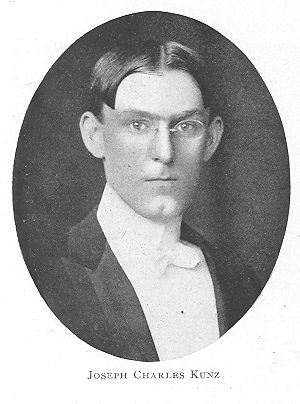
Joseph Charles Kunz, Solo pianist and instructor of music, and organist and chorus director of the Church of the Immaculate Conception of Toledo, Ohio. was born on the 28th of April, 1879, at Toledo, the son of Peter Kunz and Matilda Harris, his father being a native of Paterson, New Jersey,
- 742 -
while his mother was born in Napoleon, Ohio. On his father's side his ancestry is German, and on his mother's side Mr. Kunz is of French and Yankee descent. His grandfather, Thomas Kunz, was Captain in Napoleon Bonaparte's army at Moscow and Waterloo, and had received honors for valorous service during the Napoleonic wars. Mr. Joseph Charles Kunz was educated in the _ Toledo public schools. Early in life he showed a remarkable talent for music, having inherited same froth his mother, who was at one time a church organist. He is the only one of a family of five children gifted with a musical talent, the rest not being musically inclined. He therefore received a very careful education in that beautiful art, and after having studied under the guidance of the best teachers in Toledo, he attended the Michigan Conservatory of Music. At the early age of twelve years Mr. Kunz first appeared in public as child pianist. Since he took up teaching and solo work as a profession, Mr. Kunz has met with remarkable success, and to-day his abilities are recognized and appreciated by the public and critics. In politics he is. a Republican, and socially Mr. Kunz is a member of the Knights and Ladies of Honor and Deputy Grand Protector of the Golden Rule Lodge, No. 2217, of that order. He also belongs o the American Federation of Musicians. Being of the Roman Catholic faith, he attends the Church of the Immaculate Conception at Toledo, Ohio. He is still unmarried. His residence and studios
are located at No. 518 Walbridge Avenue, Toledo, Ohio.
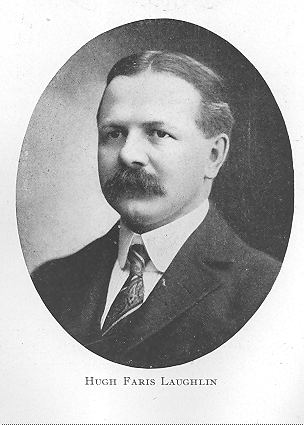
Hugh Faris Laughlin, Supervisor of Music in the public schools of East Liverpool, Ohio, was born on the 13th of June, 1869, at Lore City, Guernsey County, Ohio. His parents, John B. Laughlin, a farmer, and Hannah (Brown) Laughlin, were both residents of this State, and were of Scotch-Irish descent. His ancesors trans-migrated from Pennsylvania to Ohio in 1803, and were thrifty farmers of the Presbyterian faith. Three uncles, William and Henry Brown and Thomas Laughlin, as also a great-uncle, Colonel James Laughlin, and a cousin, Captain John W. Laughlin, saw hard service in the War of the Rebellion. Thomas Laughlin
- 743 -
was taken prisoner and died, in Tennessee. Mr. Hugh Faris Laughlin was educated in the Lore city common schools, Senecaville High School and the Ohio Northern University at Ada, Ohio, from which institution he graduated on the 27th of July, 1897, having taken a thorough course in voice and harmony. At the age of twenty-eight, Mr. Laughlin started in public life as a teacher of voice in the city of Bellefontaine, where he remained for one year. While at Ada College he was engaged as an assistant instructor, and later taught in a small college at West Liberty, Ohio, and did class and chorus work in the vicinity of Bellefontaine. Previous o his study of music he was a successful farmer and vegetable grower. He has been supervisor of music in East Liverpool for seven years, and is director of music at the First Presbyterian Church and Second U. P. Church, and in addition to the above is engaged in the profession of teaching voice. Mr. Laughlin has composed a number of gospel songs, anthems and children's melodies. In politics, Mr. Laughlin is a Republican, and socially he belongs to the order of the K. of P. Mr. Laughlin has had remarkable success as a chorus and choir director and as an institute instructor has awakened intense interest wherever his work called him. On the 4th of June, 1901, he was united in marriage to Miss Olive S. Pike, an accomplished young lady of Lisbon, Ohio. One child is the fruit of this union, Robert Faris. The Laughlin family attends the Presbyterian Church of East Liverpool, Ohio. The residence and studios of Mr. Laughlin are situated at No. 195 Pennsylvania Avenue, that city.
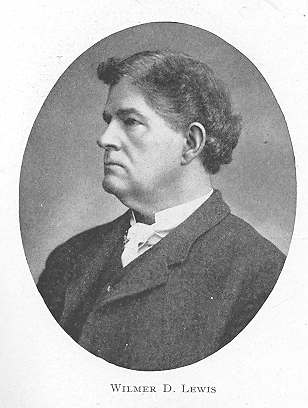
Wilmer D. Lewis, Who enjoys the reputation of being one of the leading musicians of the city of Dayton, Ohio, is a native of Philadelphia, Pennsylvania, being born on the 8th of November, 1853. His parents lived for many years in his native city and occupied a recognized position in the Quaker City society. The father, Lewis Lewis, was a member of the well-known firm of Wilmer, Cannel & Co., and a native of Scotland, the mother having been born in the city of Chester, Pennsylvania. The Lewis family was particularly well known in church circles, the father, Lewis Lewis, occupying the position of vestryman of St. Mark's Episcopal Church for the period of twenty years. He was a descendant of Sir William Blackstone's brother, and lawyers and jurists in his family have been numerous. Mr. Lewis' mother's great-grandfather, Dr. Dick, was George Washington's physician, and attended that illustrious patriot during his last and fatal illness. Mr. Wilmer D. Lewis is a gentleman of culture and natural refinement, and received a very careful training and education. He was under the tutorship of Dr. Faires, of Philadelphia, and also attended .the University of Pennsylvania. His musical education was obtained under the guidance of the celebrated Max Ballmann and Enrico Campobello, the great barione. Mr. Lewis, who at present is director of the Dayton Conservatory of Music
- 744 -
and the vocal instructor in that institution, has been a concert soloist and teacher for many years. From 1900 to 1903 he was Professor of Vocal Music and Musical Literature at Wittenberg College, Springfield, Ohio. His numerous musical compositions, notably songs, have attracted the attention of the music lovers of the country. Mr. Lewis is well known in secret society circles. He has been a Mason for the past twenty-five years, and an Elk for eight years. His reputation as a thorough, conscientious teacher of voice culture is well established and recognized, and a great many of his pupils have gained the top of the ladder in their profession. Under President Harrison's administration, Mr. Lewis was appointed Inspector of Customs and Deputy-Collector at Tampa, Florida, which position he filled from 1891 to 1894. During his residence in Florida he put out an orange grove which upon maturity was estimated to be worth $45,000. But, unfortunately for him, the entire grove was ruined by the phenomenal freeze of 1894-1895, when the thermometer went down o 14 degrees Fahrenheit. On the 22d of Ocober, 1879, Mr. Lewis was united in marriage to Miss Annie I. McIlvaine, the accomplished daughter of the leading physician of Cedar Keys, Florida. The Lewis family are members of the Episcopal Church, and attend the Christ Church of that faith in Dayton, Ohio. His residence and studios can be found on the corner of First and Perry Streets, Dayton, Ohio.

Charles Liebman, A musician of high standing in the northeastern part of the State of Ohio, was born on the 30th of June, 1856, at Dayton, Ohio, where his father, Mr. Lipman Liebman, a rabbi, occupied a leading position. Rabbi Liebman and his wife, a former Miss Fannie Hess, were natives of Eppingen, Baden, Germany, and came to the United States in 1853, settling in Cincinnati, where Mr. Liebman became associated with the late Rabbi Wise, where their friendship was established, which only terminated with the death of that celebrated gen-tleman. Mr. Charles Liebman was educated in the public and High Schools of Youngstown. He commenced his musical studies in Columbus and Cleveland, and was a pupil under John Underherr, a piano teacher of great reputation. He afterwards entered Dana's Musical Institute at Warren, Ohio, and was one of the first graduates from that celebrated school. After a short concert tour, deciding to complete his musical education, Mr. Liebman went to Boson and for two and a half years attended the New England Conservatory of Music, graduating from the same. Removing o New York City, he engaged in his profession for one year, when he accepted a position o travel with a concert company. Receiving a flattering offer from Youngstown, Ohio, o locate in that city, Mr. Liebman canceled his engagement with the concert company and decided to make his home there. In Youngstown he has done more than any other musician o further the interests of his profession, and has been musical direcor of
- 745 -
the opera house orchestra from the time of its opening. For twenty-six years he has conducted the Youngstown Maennerchor, the leading singing society of that city. Mr. Liebman is a composer of great merit in instrumental and vocal music. He was married in 1878 to Miss Emma Ritter, and is the father of six children, four girls and two boys. One of the sons, J. Edwin Liebman, has shown a remarkable talent for music, and has already gained a splendid reputation for one so young. During his stay in Youngstown, Mr. Liebman has instructed pupils of the best families in his community, and is looked upon as a man of great ability and wide experience. He lives at No. 708 Wick Avenue, Youngstown.

Joseph G. Liddicoat Of Cleveland, Ohio, member of the Faculty of the Cleveland School of Music, instructor of the mandolin, guitar and banjo at the Western Reserve College for Women, and composer of note, is a native of England, in which country he was born at St. Blaizie, Cornell, on the 4th of June, 1859. His father, Thomas Liddicoat, a miner, emigrated with his family to the United States when Joseph had reached the age of five years, and settled in Michigan. Here his son received the first rudiments of an education. After eight years, Mr. Thomas Liddicoat moved with his family to New Jersey. When eighteen years of age, Mr. Joseph G. Liddicoat left school and started into business life at Scranton, Pennsylvania, as a clerk, remaining in that vocation for fifteen years, studying music in his leisure hours, for which art he demonstrated a remarkable talent. It was during that time that he became a member of the Thirteenth Regiment Band, N. G. Pennsylvania, playing the clarionet. After five years he severed his connections with the band and came o Cleveland. Here he soon became identified with the musical interests of the Forest City, and since more than thirteen years he has instructed large classes in the playing of the guitar, banjo and mandolin. Among his pupils are the very best citizens of Cleveland and their children—for instance : Congressman Beidler, the son of Governor Herrick, Mayor Tom L. Johnson's two children, etc. It was Mr. Liddicoat who started the first mandolin club of the Western Reserve University, and outside of above-named duties he is director of Many institutional classes of Cleveland, and private teacher of his favorite instruments at No. 319 Bangor Building. As composer of many compositions for complete mandolin orchestra, he enjoys a wide reputation. He was married in 1884 o Miss Maud Bennett, of Scranton, Pennsylvania. Two daughters are the issue of their union ; one of them, a highly talented pianist, banjoist and mandolin player, first appeared in a public concert at the early age of eight years.
- 746 -
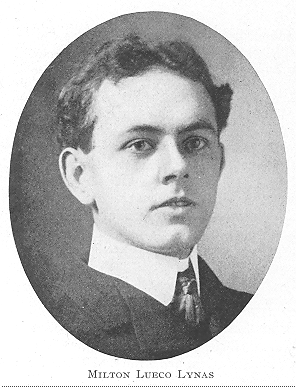
Milton Lueco Lynas, Of Columbus, Ohio, a young and promising musician, who is making rapid strides in his profession, is a native of St. Louis, where he was born on the 16th of October, 1881. His parents are Edward M. Lynas, a wholesale grocer, and Ella Lucinda Lynas, both of whom came from PennSylvania, their native State, and are of English-Scotch descent. When a child, Mr. Milton L. Lynas came to Columbus, where he was educated in the public and High Schools. Showing a fine talent for music when a boy, his parents decided to give him a careful training, and consequently they placed him under the tutorship of Professors Parkinson, Schoppelrei and Gale, all of whom were men of splendid attainments in the musical profession. As soon as he had completed his musical studies, Mr. Lynas began the teaching of music, and in that art has gained marked success. While being a young man, he has a brilliant future before him. Mr. Lynas is a member of the A. F. of M. He has his residence and studios at No. 493 West Fourth Avenue, Columbus, Ohio.
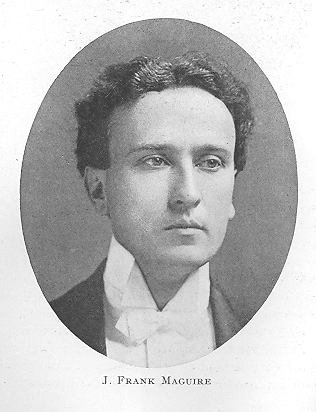
J. Frank Maguire, Director of the Wittenberg Conservatory of Music, at Springfield, Ohio, was born on the 19th of October, 1876, in the city of Boston, Massachusetts. Surrounded by a musical atmosphere, Mr. Maguire developed an early taste for music, which became so pronounced that after his literary education was received, it was decided o embark him upon the career which he has so ably filled in later years. He enjoyed the instruction of various teachers of the New England Conservatory of Music:the principal ones being Charles Dennee, the head of the piano department, and Dr. Percy Goetchius, the noted theorist.
After several years of assiduous teaching, impelled by the constant desire for further knowledge, Mr. Maguire took up his studies with Mme. Anoinette Szumowska, of Paris, who was a pupil of the great Paderewski. After two years of hard study abroad, Mr. Maguire returned to his native shores, and in
- 747 -
1902 was elected from forty-five applicants, some from abroad, as director of the Wittenberg Conservatory of Music. He is now filling his third successive term in that position as proof of his ability. In that institution he teaches piano, pipe organ and theory. He has composed numerous songs. Mr. Maguire is a musician of sterling ability and pronounced talent, well versed in modern and classic literature. He possesses the touch and temperament of the genuine artist, and the general impressions culled from various opinions as a teacher are that he possesses naturgl endowment, acquired skill and professional enthusiasm. He has recei.ved from some of the best musicians in this country many letters of encomium, among which the following from Mr. Charles Dennee, of the New England Conservatory . of Music, may be published as an example:
"I wish you every success in your work. You have the temperament and artistic ideals, and the sort of brilliancy which should gain excellent results in your community. I was pleased with the analytical manner with which you work things out, and as this always. betokens a thorough method of working with your own pupils, I am quite confident of your success in that line.. With best wishes, I am sincerely yours,
CHARLES DENNEE."

J. O. Manville, Supervisor of Music in the Public Schools of Warren, Ohio, is a young musician of more than ordinary talent and ability. He was born In the 21st of March, 1878, at the beautiful little village of Willoughby, Lake County, He attended the public schools of his tome village and graduated from the Willoughby High School, and received his musical education from some of Cleveland's best musicians. Mr. Manville is a good violinist and possesses a pleasing tenor voice. He began teaching music in the Willoughby schools in 1898, and was appointed Supervisor of Music in the public schools' of Warren in he fall of 1903. He has been very successful in this line of work, and is devoting his whole time to it. Besides his school work, Mr. Manrine directs a choir in the M. E. Church at his tome, and is the leader of a fine orchestra. He is fast becoming known in the school circles of Ohio, and his prospects of success seem very bright.
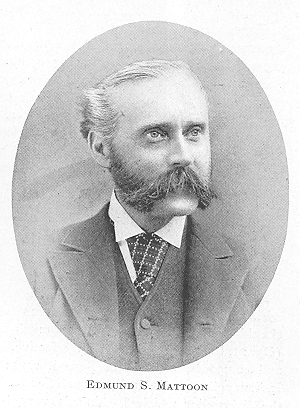
Edmund S. Mattoon, There was a time not very far back when the word musician was considered as synonymous with German, or at any rate foreigner. The teachers of the piano and the violin were all Germans and the teachers of singing all Italians. Music was classed among the amusements strictly, and its value was ch iefly acknowledged as an innocent time-kilier for young girls. The last quarter of a century, however, has produced a change in the attitude of the American mind toward the great art of music, which is almost as wonderful an illus-
- 748 -
tration of revolution as that which the intellectual life of mankind has taken in its relation-ship o Darwinism. Now, there are not wanting many native-born Americans who adopt music as a business. Among these, Edmund S. Matoon is a notable instance. He was born at Columbus, Ohio, in the year 1841. In him the adage about men of esprit inheriting their talent from the mother is again exemplified. She was of decided musical tastes and gifts, and Mr. Mattoon's talent has always been of that versatile, many-sided character which finds its best expression at the piano-forte, the director's stand, and the composer's desk. He resides at present in his native city, whither he was called in 1874 by the advancing age of his father, his mother having died. Previous o that date, he spent a period of about ten years in Detroit, exercising the profession of piano teacher and organist. He also held in earlier life the post of teacher at the Xenia Female College, and a similar position at the Ohio Wesleyan University, Delaware, Ohio, in the days when it was a separate school, not as yet merged in the Ohio Wesleyan University, being Direcor of Music in both institutions. He also has had some experience of operatic life, having traveled with the Caroline Richings and the Campbell & Castle Opera Commpanies as pianist and musical director ; also with the brilliant cantatrice, Marie Litta. The report which comes from all these sources only reinforces the conviction that he is in all things a rounded musician and an effective, energetic worker. In boyhood he was what the Germans call a "wunder kind," and in the capacity of boy virtuoso was frequently exhibited o an admiring and prophesying public. Having been taken as the protege of a musical lady, Mrs. Isabella Chapman, to New York City, he there received the painstaking and valuable instruction of the celebrated pianist and composer, Wollenhaupt, of whom he has always spoken with great respect and even veneration. Indeed, it is not difficult for a discerning ear and critical mind to detect in the lighter compositions of Mr. Mattoon, not the imitation of Wollenhaupt's manner exactly, but what may be called a transferred and kindred glow. During his long period of artistic service in the city of his birth, he has, besides producing many accomplished pupils, served the First Congregational Church, Wesley Chapel M. E. Church, First Presbyterian and various other Christian congregations in the capacity of organist, with the completest success, and that union of artistic judgment with almost religious feeling which is rarely to be found ambit the musical servants of Protestant churches. _
In the year 1887, a golden year for the O. M. T. A., Mr. Mattoon was among the most active spirits, having a large part of the local management devolved upon him, and appearing before the assembly in various important roles—piano soloist, accompanist, lec-turer and the like. The previous year he also read an admirable paper on Pianoforte Study and Practice: The year 1887 was the time when. Johannes Wolfram had, with Titanic
- 749 -